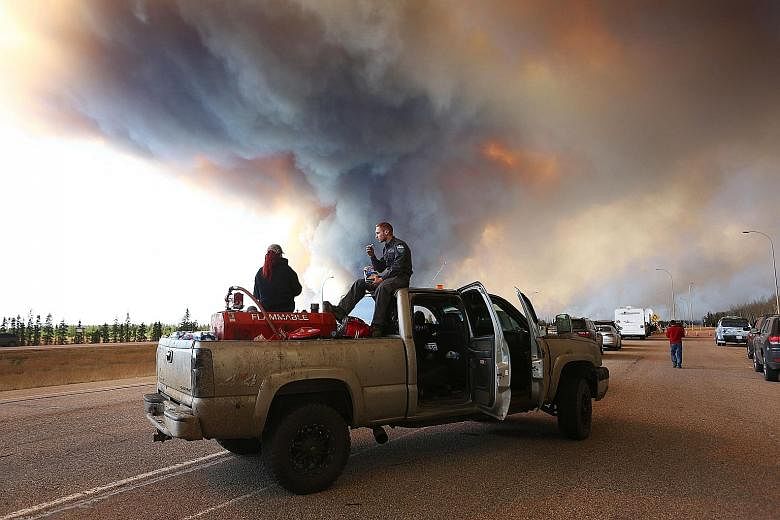FORT MCMURRAY (Alberta) • Wildfires raging through the Canadian province of Alberta have spread to the main oil sands facilities north of Fort McMurray, knocking out an estimated one million barrels of output from the country's energy hub.
As the fire blazed for a seventh day yesterday, officials warned almost 100,000 people who fled the area that they would not be returning home soon.
The out-of-control inferno may keep burning for months without significant rainfall, they said.
The blaze, forecast to expand to more than 2,500 sq km in the next few days, made an "unexpected" move to the north last Saturday, rapidly encroaching on bitumen mining operations run by Suncor Energy and Syncrude Canada.
The fires may soon cover an area the size of Luxembourg and may become the costliest catastrophe in the country's history with insurance losses potentially reaching C$9.4 billion (S$9.9 billion).
"It is a dangerous and unpredictable and vicious fire that is feeding off an extremely dry Boreal forest," said Federal Public Safety Minister Ralph Goodale.
The fire, which started last Sunday near Fort McMurray in northern Alberta, spread so quickly that the town's 88,000 inhabitants barely had time to leave. Large parts of the town no longer exist.
Still, in a glimmer of positive news, the authorities have recorded no fatalities directly linked to the blaze.
More than 500 firefighters are in and around Fort McMurray, along with 15 helicopters, 14 air tankers and 88 other pieces of equipment. The strain is so intense that fire crews are being rotated more quickly than usual. One exhausted fireman told CBC television that members of his team were working up to 40 hours without sleep.
The government has declared a state of emergency in Alberta, a province the size of France that is home to one of the world's most prodigious oil industries.
The wildfires have led to combined production cuts of more than one million barrels of oil a day, or about 40 per cent of the region's output of 2.5 million barrels, based on IHS Energy estimates.
The cuts, and the mass exodus of more than 80,000 people, are another blow to Fort McMurray's economy already mired in recession from the oil price collapse.
Winds were pushing the flames east of the epicentre around the oil city late Saturday, as nearly all 25,000 people who were still trapped finally left town, either via airlift or convoys on the roads.
Making their way through thick, black smoke, the cars were filled with people who had earlier sought refuge in the northern area.
Police wearing face masks formed convoys of 25 cars, with long lines of vehicles, smoke swirling around them, patiently awaiting their turn. Separate convoys of trucks carried essential equipment to support "critical industrial services", said the state government
Mr Sam Osterhagen, a welder who was working near the oil hub, spent most of his 40th birthday in the convoy after lining up early on Saturday morning.
He and his co-workers were stuck for three nights at a campsite, watching as the fires burned. It looked like an orange ball glowing in the distance, with flames a couple hundred feet high, they said.
"I didn't think I was going to make it," Mr Osterhagen said.
BLOOMBERG, REUTERS, AGENCE FRANCE-PRESSE

